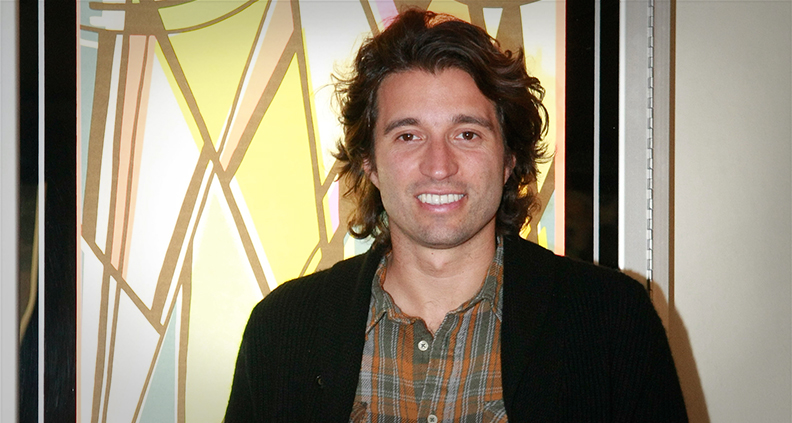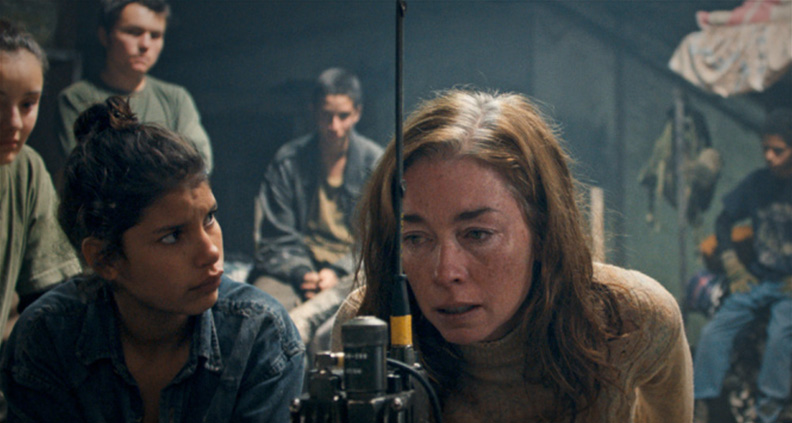‘Monos’ Director on Modern War, Conflict and Coming of Age
Now in limited release, South American filmmaker Alejandro Landes’ Monos is one 2019’s most hypnotic, intense and visually arresting international indies. Our September Don’t Miss Indies Programmer’s Pick, the film follows a frayed band of child soldiers muddling along the far edges of an abstracted civil military conflict, charged with transporting a female hostage (Julienne Nicholson, in the film’s only significant adult role) from one precarious rendezvous to another—all while dealing with the normal trials of adolescence and interpersonal drama.
Though Apocalypse Now and Lord of the Flies have been two common reference points for discussing the film, Landes says he was largely inspired by ongoing civil conflict in his native Columbia. His goal, he says, isn’t simply to wallow in the tragedy of child soldiers, but to use the framework of war films and coming-of-age narratives to explore more universal aspects of human nature. And things were just as intense behind the camera as in front of it, with multiple near-miss disasters threatening to derail the shoot at every turn.
We recently spoke to Landes about the film, including the difficulties of selling such a unique project to investors, creating a “band of brothers” among his young cast, being carried out of the jungle on a stretcher and much more.
ALEJANDRO LANDES

Monos is such a unique film. I wanted to start by asking how you would describe this film to a potential audience member, but also how you described the project to potential investors at the beginning. Are those two descriptions different at all?
Landes: That’s a great question. I always described it as a bit of an epic journey, with two conflicts. One is that conflict of adolescence, hormones and everything one experiences as a teenager, with the exterior conflict of war, a war of shadows akin to what’s happening in the world today. War today is often fought in places with no name and without us knowing by drones and covert operations. I pitched that conflict between adolescence and war as a sort of window into human nature. We knew we wanted to do something that flirted with that genre, which is not so common when you’re pitching auteur cinema in the typical sort of European-Latin American film funds; [Monos] has more of an epic scale that fit in with genre, which is sometimes even frowned upon in those circles.
In some ways the film is potentially more ambitious—or at least higher concept—that your typical sort of international art house film.
Landes: [Funders] want to know, is it an action film? Is it a war film? Is it coming-of-age? The film navigates its different identities but doesn’t put a sticker on it. So that’s what was tough for me in the pitching—people want to classify it, put it into a box, and I was always pitching this sort of strange beast.
What is it about the subject of child soldiers and the tragedy that situation that appealed to you as a filmmaker?
Landes: Well, I certainly didn’t have to spend four years of my life trying to say that children don’t have a place in war and try to create a film that just builds pity upon pity, that’s definitely not my aim. What I wanted to do was explore a moment of life that’s a sort of knife’s-edge moment, where you’re not a child but you’re not an adult—when there’s that tension between the two things—and then use that as a metaphor. The inspiration is Columbia, which is where I come from, which has experienced 60 years of civil war, and which now has a possibility for peace. And again, you have the nature of conflict today, which is a war told from the backlines. What I think is novel about Monos is that, as opposed to films where you have these very epic front lines where you have a clear idea of what you’re fighting for and a clear idea of when you’ve won or lost, here that almost takes second place. You’re at the back lines with a small squad, moving around and completely de-contextualized. And I think that makes it very exciting, because that’s how my generation has experienced war.
Is your approach to working with young actors different than your approach working with adults? Does it vary based on the material?
Landes: You need to sort of create a band of brothers and sisters. The key was having [the cast] live together for a week before we started shooting. We had four weeks where we put together this sort of mock boot camp. Kids were eating, breathing and sleeping in the same cabin and that really brought them together. And while they were living together I was able to actually watch the dynamics as if they were in a schoolyard—who flirted with who, who hung out with who, who fought with who. By doing that, I was able to re-write the screenplay and make sure that I was able to bring them [the actors] onto the page and not only force the page upon them. When it came to getting these kids to these incredibly difficult emotional states, knowing a lot about them really helps. I had to know about them so I could help bring them into that moment.

I love that Julienne Nicholson is in this film; she’s such an underrated performer. Could you discuss her role in the film as the hostage?
Landes: I always saw the film, in a strange way, like Snow White and the Seven Dwarves. There’s something almost fairy tale and very iconic to her [Doctora, the hostage] and Julienne has that physicality, that iconic look to her, that was very interesting to me. We’ve seen her onscreen be very tender and sweet. I thought it was interesting to take that tenderness and turn it violent. I think that was something she hadn’t done before and would be very interesting to see her do.
Her relationship with her child captors is such a unique dynamic to see, where she’s almost their mother at times.
Landes: It comes out of real life, and not just in Columbia. Kidnapped people who have been abducted by some rebel group—be it from the right or the left—the higher-ups are negotiating the kidnapping for political or economic reasons, but the day-to-day guards, who are they? What’s the cheapest way to take care of a hostage? The cheapest way is the lowest-run on the ladder in this military unit. And a lot of the time the lowest rung is the youngest soldier’s kids.
What were some of your references for the film’s cinematic tone?
Landes: I really like that [Luis] Buñuel idea of the “waking dream.” This is a film born out of a very concrete reality but has a ghostly feel, and not just for stylistic reasons. And yeah, Conrad’s Heart of Darkness was important, the tone of that was important for me. We looked at the photography of Bill Henson, also of Nan Golden. We even looked at Gummo, by Harmony Koirine, for that freshness and those faces of that adolescent experience. It doesn’t bother me when people get stuck on Lord of the Flies—the film flirts with genre and flirts with pop culture.
What was the most difficult day on set, or the most difficult thing to accomplish while shooting?
Landes: God, that’s a tough one. The first day, someone in the camera department had an epileptic fit and we had to bring him down from 13,000 feet in the air, and from then on it just did not stop. Everyone cried on set. I had my day where I was carried out from the jungle canyon on a stretcher by a few gold miners because they thought my appendix was going to burst. We just kept going, because we were on a shoestring and everyone just really had to push. One day after a very heavy rain, we were in a ravine and then there was this snap and a 40-foot tall tree just fell right before the feet of Rambo [Sofia Buenaventura] and the rest of the kids were there. Everyone just saw, like, death inches away. Everyone just completely broke down and there was nothing we could do about it. But really, it was a contagious spirit that the kids left, where everyone was just going beyond their breaking point. And everyone reached it—believe me!
Monos is currently playing in limited release. To learn more about the film, please visit its website. Learn more about Alejandro Landes here.